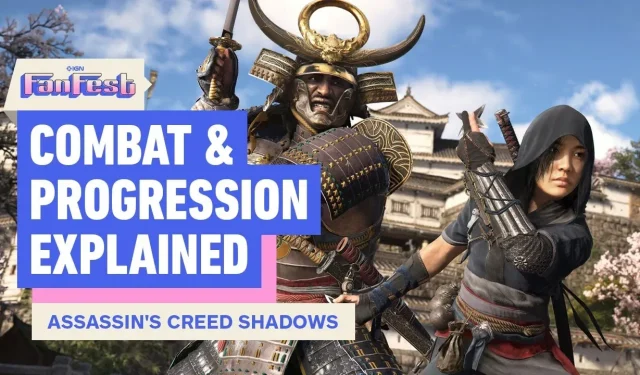The highly anticipated Assassin’s Creed Shadows marks an exciting new chapter in the long-standing franchise. Set in the captivating backdrop of feudal Japan, the game introduces players to the intertwined destinies of Naoe, a shinobi Assassin, and Yasuke, a formidable samurai. This exploration of their journey through the tumultuous Sengoku period offers a rich narrative filled with cultural significance and thrilling gameplay. In a recent discussion with Creative Director Charles Benoit, key elements such as combat mechanics, progression systems, and the overall design philosophy were unveiled. In this article, we will delve into the specifics of these features and their implications for players and the gaming landscape as a whole.
Combat Mechanics: A New Approach to Assassin’s Creed
Assassin’s Creed Shadows promises to redefine combat within the series, seamlessly blending traditional mechanics with innovative features tailored to the game’s setting. Players will engage in dynamic combat that not only emphasizes skill but also incorporates strategy. The duality of Naoe and Yasuke lends itself to diverse combat styles, allowing players to choose between stealthy takedowns as a shinobi or engaging head-on as a samurai. This adaptability is essential in the Sengoku period, where choice can often lead to life or death.
The combat system is designed to be fluid and responsive, placing importance on timing, rhythm, and the mastery of unique abilities. Whether through the swift strikes of a shinobi or the powerful slashes of a samurai, players will find themselves immersed in a beautifully choreographed ballet of violence that honors the historical context of the era. This fresh direction is bound to attract both longtime fans of the franchise and newcomers seeking an accessible yet challenging experience.
Progression Mechanics: Skill Trees and Loot Systems
In addition to combat, progression in Assassin’s Creed Shadows is anchored by a thoughtfully designed skill tree system. This feature allows players to customize their character’s abilities and playstyle, offering a level of personalization that is crucial in RPG elements. As players advance through the game, they will unlock new skills that reflect their journey, mirroring the growth and evolution of Naoe and Yasuke amid the societal upheaval of the Sengoku period.
Moreover, the loot system introduces an engaging layer of discovery and reward. Players will engage in exploration not just for the sake of story progression but also to uncover valuable items that enhance their abilities and provide equipment that can be used in combat. This focus on both story-driven and mechanical progression ensures that players feel a constant sense of achievement as they delve deeper into the game’s world.
Cultural Relevance: The Sengoku Period and Beyond
The setting of feudal Japan, particularly during the Sengoku period, is rich with cultural and historical significance. Through the dual narratives of a shinobi and a samurai, Assassin’s Creed Shadows promises to provide an insightful exploration of themes such as honor, duty, and the personal stakes involved in times of war. This representation is particularly important as it brings nuanced perspectives to a popular gaming franchise, encouraging players to engage with the history and culture of Japan beyond mere aesthetic appreciation.
By placing these characters in a historically significant context, the game taps into a larger narrative about identity and the nature of choices in a world rife with conflict. This deeper exploration resonates with players looking for not just entertainment but also meaning in their gaming experiences, bolstering the franchise’s reputation for thoughtful storytelling.
The Future of the Assassin’s Creed Franchise
Assassin’s Creed Shadows represents a pivotal moment for the franchise, merging traditional gameplay elements with innovative mechanics and historical depth. As the game continues to generate buzz within the gaming community, it has the potential to set new standards for action RPGs. The development team’s commitment to marrying gameplay with rich narrative has positioned Assassin’s Creed Shadows to be a significant player in the ongoing evolution of the series and the broader gaming landscape.
As fans and newcomers alike await its release, the excitement surrounding the game serves as a reminder of the enduring appeal of the Assassin’s Creed franchise and its ability to adapt while retaining its core identity.
Conclusion
With Assassin’s Creed Shadows, players are poised to experience a unique blend of combat mechanics and cultural narratives set against the fascinating backdrop of feudal Japan. Through Naoe and Yasuke, players will explore themes of honor, conflict, and growth during a historically rich period. As we anticipate further details and the eventual release, we invite readers to reflect on how video games can promote understanding of diverse cultures. What does this mean for future titles in the gaming landscape?
https://www.youtube.com/watch?v=aVzqcoQkRwI


